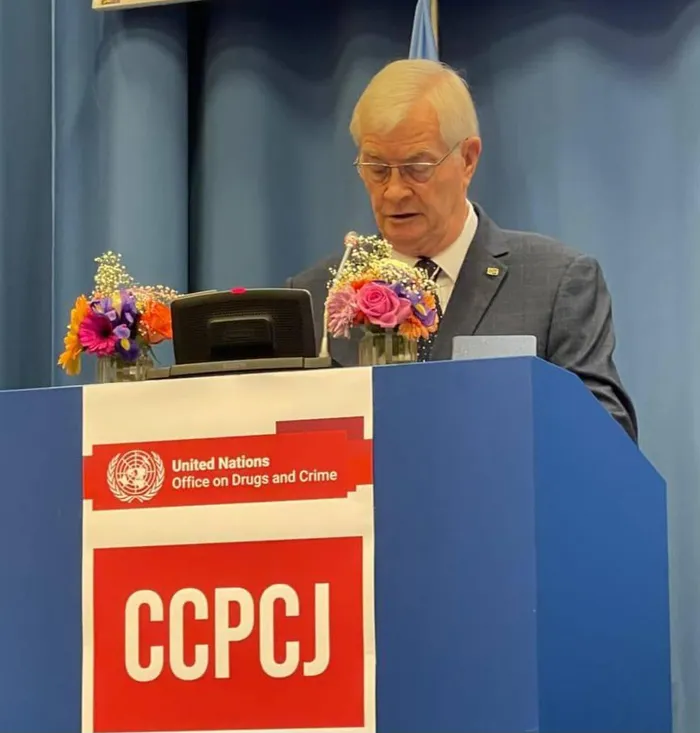South Africa’s call to the UN over dangers of cybercrime and organised crime

During the UN Commission on Crime Prevention and Criminal Justice session, Correctional Services Minister Pieter Groenewald stressed the significance of global cooperation in the fight against cybercrime.
Image: Facebook/ Department of Correctional Services
Correctional Services Minister Pieter Groenewald says international collaboration is essential for combating modern threats such as cybercrime, which erode the rule of law and negatively affect the quality of life for all citizens, particularly vulnerable populations.
He also announced that South Africa is in the process of creating a National Transnational Organised Crime Strategy to address these issues.
This formed part of South Africa’s national statement at the 34th session of the United Nations Commission on Crime Prevention and Criminal Justice (CCPCJ) in Vienna, Austria.
Groenewald said the CCPCJ is convening at a significant moment, as the international community marks the 10th anniversary of the adoption of the United Nations Standard Minimum Rules for the Treatment of Prisoners, also known as the Nelson Mandela Rules, and the 15th anniversary of the Bangkok Rules.
He said these reflect the global consensus that the dignity and human rights of all persons, including those deprived of liberty, must be respected.
“As we confront new, evolving, and increasingly complex forms of crime, ranging from cybercrime to crimes that affect the environment, it is imperative that our justice systems remain firmly anchored in the rule of law and guided by the fundamental principles of human rights,” Groenewald said.
“In this context, South Africa welcomes the timely deliberations of this session, recognising that these emerging forms of crime pose a growing threat to global peace, security, and sustainable development. We welcome the theme’s alignment with Actions 7 and 24 of the Pact for the Future and the 2030 Sustainable Development Agenda.”
The Minister said that although South Africa supports the ongoing reform of the United Nations to enhance system-wide coherence and realignment of priorities and financial resources, it is concerned about the ongoing liquidity crisis facing the United Nations Office on Drugs and Crime (UNODC) and its adverse impact on programme delivery and technical assistance, particularly to developing countries.
However, the country affirms its support for the role the UNODC plays in addressing transnational organised crime.
“South Africa calls for strengthened international cooperation to effectively address evolving threats, which undermine the rule of law and impact the quality of life of our citizens, particularly the most vulnerable, such as women, children and youth,” Groenewald said.
“In this regard, I wish to inform that South Africa is developing a National Transnational Organised Crime Strategy to prevent and combat transnational organised crime.”
“To enhance the fight against crime and ensure uniformity, Member States are encouraged to harmonise their legal frameworks by ratifying and implementing international legal treaties, such as the recently adopted UN Convention against Cybercrime, which serves as a pivotal international framework to combat cybercrime, strengthen international cooperation and facilitate technical assistance and capacity-building support, particularly for developing countries,” Groenewald continued.
Groenewald urged Member States to sign and ratify the instrument for early entry into force and also adopt innovative crime prevention approaches to build a safer and more resilient world.
Meanwhile, on behalf of the African Group, ambassador, permanent representative of Burkina Faso and chair of the Africa Group to the Permanent Missions to the United Nations in Vienna, Maimounata Ouattara, urged all United Nations Convention against Corruption (UNCAC) State Parties to impose a system-wide zero tolerance policy against corrupt practices. Ouattara highlighted the necessity to take urgent measures to prevent, prosecute and deter all forms of corruption, to strengthen international cooperation to effectively prevent and counter money laundering and illicit financial flows and enhance measures for the identification, tracing, freezing, seizure, return of assets and recovery of all proceeds of crime or corruption, to deny them safe havens through their eventual confiscation.
Cape Times